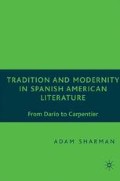Abstract
How meaningful is it to think of César Vallejo as a representative of a non-Western tradition, a tradition opposed to the Western tradition and certainly to Western modernity? Two subsidiary questions immediately arise: what do we understand by the phrase non-Western and what would it mean here to be a “representative”? I shall approach these questions by drawing in turn on two traditions of criticism that have acquired prominence in the Western academy in recent decades and at the heart of which lies an overt political concern to redress the intellectual as much as political misrepresentation of those areas of the globe that fall outside the main Western powerbloc. The respective traditions are those of postcolonial theory and Latin American cultural studies.
Access this chapter
Tax calculation will be finalised at checkout
Purchases are for personal use only
Preview
Unable to display preview. Download preview PDF.
Notes
Frantz Fanon, The Wretched of the Earth trans. Constance Farrington (Harmondsworth: Penguin Books, 1967; reprt. 1985), p. 27.
Stephen Henighan, “Caribbean Masks: Frantz Fanon and Alejo Carpentier,” in Postcolonial Perspectives on the Cultures of Latin America and Lusophone Africa, ed. kobin Fiddian (Liverpool: Liverpool University Press, 2000), pp. 169–190.
Gayatri Chakravorty Spivak, “Can the Subaltern Speak?” Marxism and the Interpretation of Culture ed. Cary Nelson and Lawrence Greenberg (Urbana and Chicago: University of Illinois Press, 1988), pp. 271, 280, and 281.
Jorge Klor de Alva, “The Postcolonization of the (Latin) American Experience: A Reconsideration of ‘Colonialism,’ ‘Postcolonialism,’ and ‘Mestizaje,’ ” in After Colonialism: Imperial Histories and Postcolonial Displacements, ed. Gyan Prakash (Princeton: Princeton University Press, 1995), p. 244.
César Vallejo, “Qué pasa en el Peril?” La cultura peruana (cr6nicas) (Lima: Mosca Azul Editores, 1987), p. 182.
César Vallejo, “Oriente y occidente,” Desde Europa. Cr6nicas y articulos (1923–1938), ed. Jorge Puccinelli (Lima: Fuente de Cultura Peruana, 1987), p. 210.
Copyright information
© 2006 Adam Sharman
About this chapter
Cite this chapter
Sharman, A. (2006). Vallejo, Semicolonialism, and Poetemporality. In: Tradition and Modernity in Spanish American Literature. Palgrave Macmillan, New York. https://doi.org/10.1057/9780230601413_5
Download citation
DOI: https://doi.org/10.1057/9780230601413_5
Publisher Name: Palgrave Macmillan, New York
Print ISBN: 978-1-349-53555-2
Online ISBN: 978-0-230-60141-3
eBook Packages: Palgrave Literature & Performing Arts CollectionLiterature, Cultural and Media Studies (R0)

